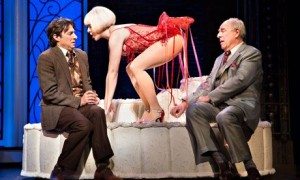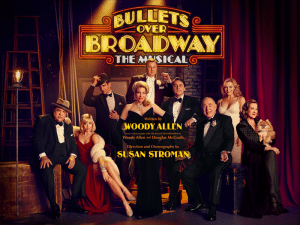
SEE OR SKIP: Bullets Over Broadway

 In this arts column, rather than provide a lengthy critique, we hit the bullet points and share our thoughts on whether a show is worth seeing or skipping. Of course, your own reasons for picking or ignoring a show might be based on price, time, discounts, availability, subject interest, word of mouth and personal taste. Feel free to add our voice to the chorus.
In this arts column, rather than provide a lengthy critique, we hit the bullet points and share our thoughts on whether a show is worth seeing or skipping. Of course, your own reasons for picking or ignoring a show might be based on price, time, discounts, availability, subject interest, word of mouth and personal taste. Feel free to add our voice to the chorus.
SHOW: Bullets Over Broadway
VENUE: St. James Theater
VENUE TYPE: Broadway
SEE because:
This is one of, if not THE best musical of its type since “The Producers”. Absolute zany fun with brilliant plotting all the way through.
Though the musical numbers are period songs, the lyrics are often changed so they usually don’t feel shoehorned into the story.
More on the plotting: unlike “The Bridges of Madison County”, which stretches one plotline and almost no interesting side characters into a very long evening, “Bullets” is brimming with funny supporting characters who all contribute not just to the laughs but to the way plot points intersect. There’s an intelligence to the design here that is downright wondrous.
Susan Stroman’s back, but her choreography isn’t about stopping the show with show-offy dance gimmicks. Dance keeps hurtling the production along.
Helene Yorke gets plenty of laughs as the buzzsaw-voiced moll of gangster Vincent Pastore.
Zach Braff, of “Scrubs” fame, makes a genuinely likable Broadway lead.
Nick Cordero steals the show as wiseguy Cheech; he’s quite scary while being immensely funny as an artiste trying to protect his intellectual property. The show wouldn’t work nearly as well without him.
Betsy Wolfe, as playwright Braff’s supportive wife, has a knockout second-act number and character change that brings down the house.
SKIP because:
Zach Braff overdoes the nebbishiness of his nerdy playwright. He’s always cringing and whinging, even at times when his character should be enjoying the wild ride more.
The final number comes completely and senselessly out of the blue, just as a way of having a silly “up” tune to end the show. (Peter Brook’s 1968 “Oedipus” did the same thing, so at least the song is much more at home here.)
If you care about such things, there are a couple of moments (only a couple) when David Shayne’s moral compromises are trailed by an uncomfortable whisper of Woody Allen’s real-life issues, but you’d have to be pretty anti-Woody to care one bit.
FINAL CALL: SEE because
This is pure locomotive comedy – bright, madcap, hilarious, beautifully structured and professionally staged. The real question is whether you’ll want to see it three or four times.